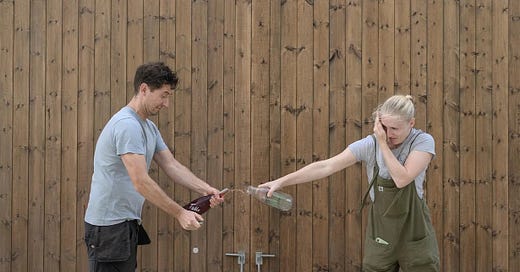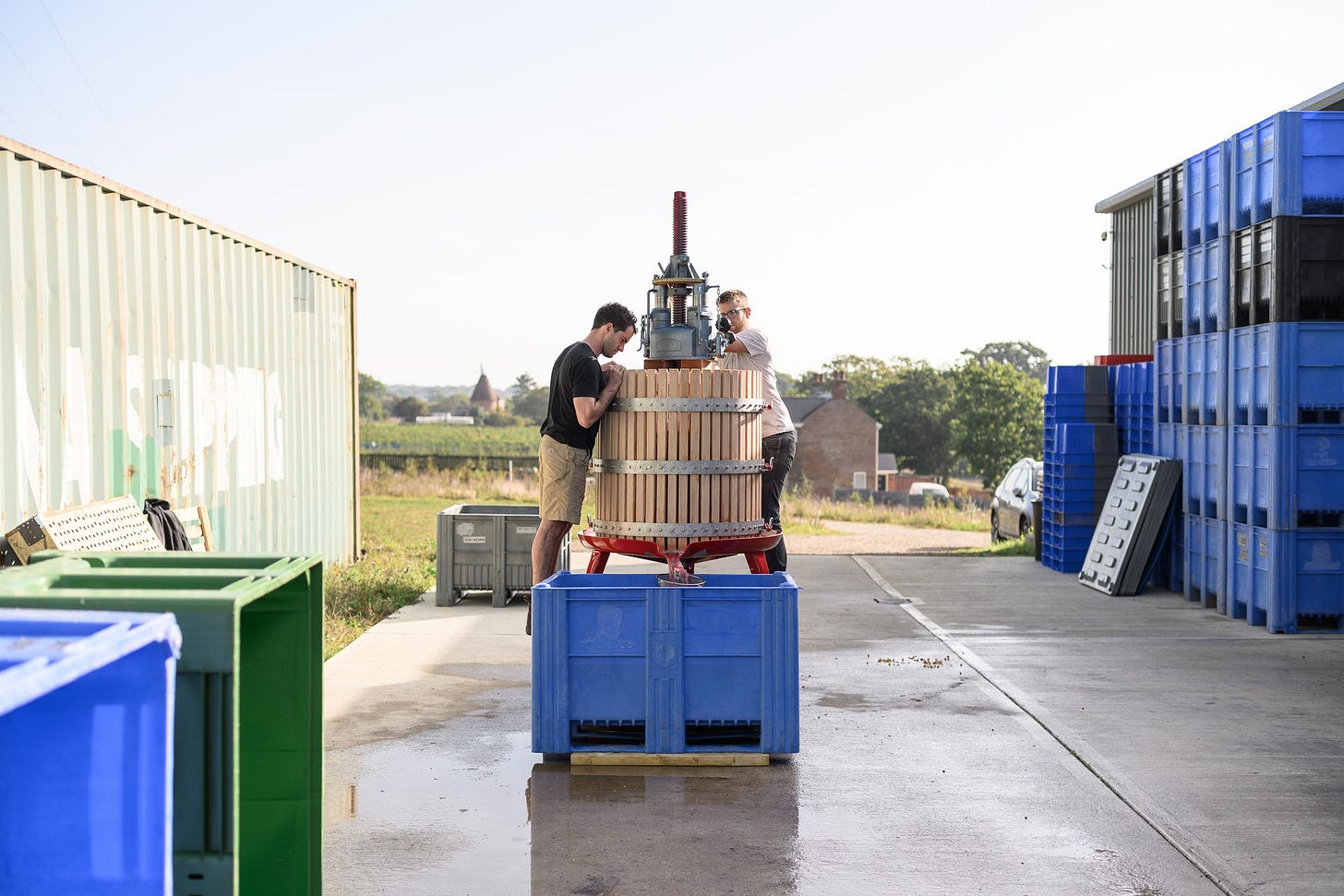Of all the commercial accountants-cum-winemakers, Lucie and Jules of Ham Street Wines have to be my favourites. The ‘desk job’ is too often the thing you do instead of the thing you want to do. We all have a pipe dream collecting dust, perhaps it's something original like starting a podcast? Dusty dreams are not so much the case for husband-and-wife duo, Lucie and Jules, whose desk jobs actively fund their no-longer-a-pipe dream, Ham Street Wines. I met Lucie at the Winemakers club in Farringdon, where we paired a Monday with cru Beaujolais and some piercing questions.
Well-seasoned in the world of accounting and tax, Lucie’s answer as to why Ham Street exists is very simple, “to get out the [fucking] office”. I asked about her relationship to wine prior to Ham Street and whether the dreaded ‘wine bug’ had nibbled her brain and talked her into a bonkers decision. She described her modest “appreciation” for wine before explaining that what was clear to both her and Jules was a desire to be “closer to the land”. In 2017, the couple volunteered at a harvest near Ham Street village, just south of Ashford. The farmer mentioned some land was for sale at which point, I imagine, the pair’s heads slowly pivoted towards one another bearing a grin reserved for expensive ideas. Lucie and Jules made a “cheeky offer” thinking it would likely be declined. Long and behold, 4 hectares were snagged south of Ashford. A farmer’s tenancy on the land delayed vines being planted until 2019, meaning 2 years could be spent fattening the piggy bank and getting up to speed on viticulture.
You would think with full time jobs Lucie and Jules might opt for less intensive viticulture; a tactical spray of stinky chemicals in between meetings and busy weeks. This was the original plan pushed by a viticulture consultant who claimed organic vineyards in the UK were literally fruitless. The couple hesitantly took this advice and sprayed glyphosate, a strong herbicide known to damage biodiversity in the vineyard. “The week we sprayed glyphosate was the week we turned fully organic”, Lucie explained as expressions of guilt made way for an understated look of pride. Since the frightful spray, Ham Street has been staunchly committed to both maximising soil health and the vineyard’s relationship to its wider ecosystem. “I want to get bitten by insects when walking between vines… and to pick up a clump of soil and see tons of worms”. Not simply a worm pervert, her desire for a vineyard teeming with life has practical roots. More living stuff in the vineyard (biodiversity) promotes healthier soils and healthier soils make for healthier and more resilient vines. This is a very simplified guide to regenerative viticulture, a tentative method of farming which would not be possible at Ham Street Wines without Dani, the full-time Vineyard Manager and “all round innovator”.
Lucie and Jules built a winery while working full time. I can't pat my head and rub my tummy simultaneously, let alone work 40 hours a week and build a 450 square-metre winery. Despite being equally impressed and intimidated by the couple’s unrelenting work ethic, what really counts is how the new winery is used. Does it remedy, dare I say, the timid approach to still winemaking in Britain? Simple styles of Bacchus specifically spring to mind here. Ham Street’s response is a Bacchus dressed to the nines using skin contact, an old burgundy barrel, and malolactic fermentation (a process that converts sharp malic acid into smoother lactic acid which can impart dairy flavours like cream and butter). I gave it a slurp at the Brighton Natural Wine Fair. It's generous with fistfuls of yellow pear, elderflower, and some tea. Still clean and fresh, it's a Bacchus with a welcome lick of quiet tannins, subtle oak, and a tongue hugging finish.
It gets better, in fact, it gets more unusual. Three words. Carbonically macerated Chardonnay (think of the bubblegum and sweet cherry whiff often found in Beaujolais or other candy-like reds, that’s often from carbonic maceration). Currently unreleased, it begs the question if it’s a technique that will work with cool climate Chardonnay? At the very least you may be intrigued by the question and at most, like me, you’re frothing at the mouth to taste the answer.
Once Lucie revealed this carbonic cuvee a clearer sense of what she and Jules are really doing emerged. Ham Street is a delicious oenological playground where the “what if” ideas are given a courageous amount of daylight. More proof of their curiosity comes from a gutsy plan to use their shiny winery like a satellite dish, hoping its reflective walls will beam enough additional heat and light to successfully ripen Riesling and even Syrah. For those unfamiliar with these grapes, they're usually grown much further south of Ashford, in Syrah’s case a whopping 500 miles south in France’s Rhone Valley. It's a tiny bit like owning a Camel in Kent, while it might be used to scarce water and high daytime temperatures, it's plausible this particular Camel takes a liking to sleeping next to an Aga and voting for the Tories. Unquestionably experimental and downright entertaining, planting Syrah will test what's physically possible to ripen in the UK and that is worthwhile. Britain is a child as a winegrowing region, and children must explore new things.
Importantly, this oenological playground isn’t Ham Street’s alone. There is a lack of space in Britain's wineries full stop, let alone for aspiring winemakers. Lucie mentioned they currently have room for up to 6 winemakers to use their equipment and storage (of course with some ground rules). These kinds of collaborative spaces are a necessary and generous service to improving British wine through opportunity. Not least because the wine industry is no stranger to stuffy gatekeeping often done by blokes with bad teeth. So, while my plump finger uselessly points at the issues, Lucie and Jules actually do something about them.
It’s all quite romantic really. Husband and wife peel themselves away from the office when they can to farm their land responsibly and produce genuinely interesting and delicious wines. Whether it's fancy Bacchus, Carbonic Chardonnay, or eventually very cool climate Syrah, Ham Street wines are having more fun than most and answering worthwhile questions as they do so. Lucie and Jules are an antidote to the established styles and issues in British wine and that is absolutely worth celebrating and buying into. Lastly, I want to thank Lucie for her time as I can’t imagine she has much of it.









Roll on that sweet and subtle Syrah!!
What a read!
I too tried the Bacchus in Brighton, it was truly delightful. Though I suspect it's far beyond the palette of a layman such as myself!
#wheelupthebludclart